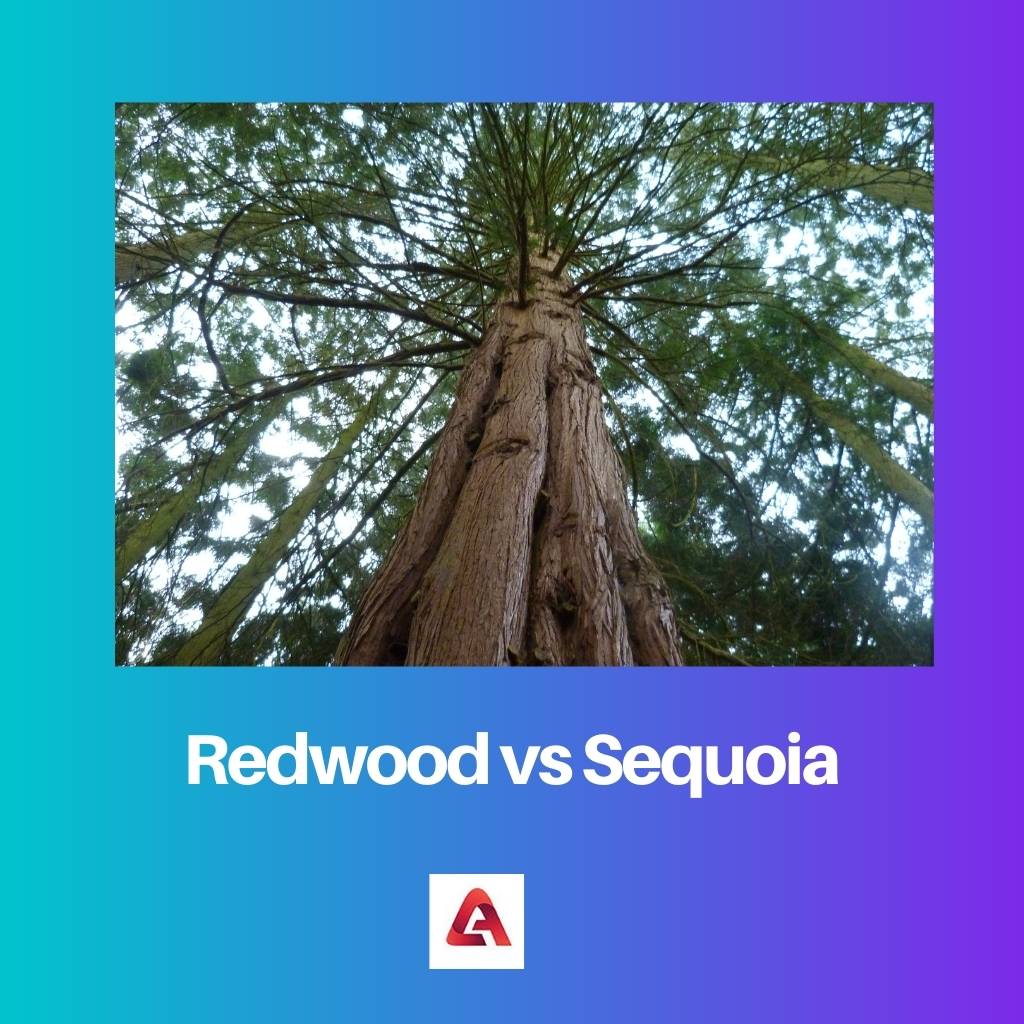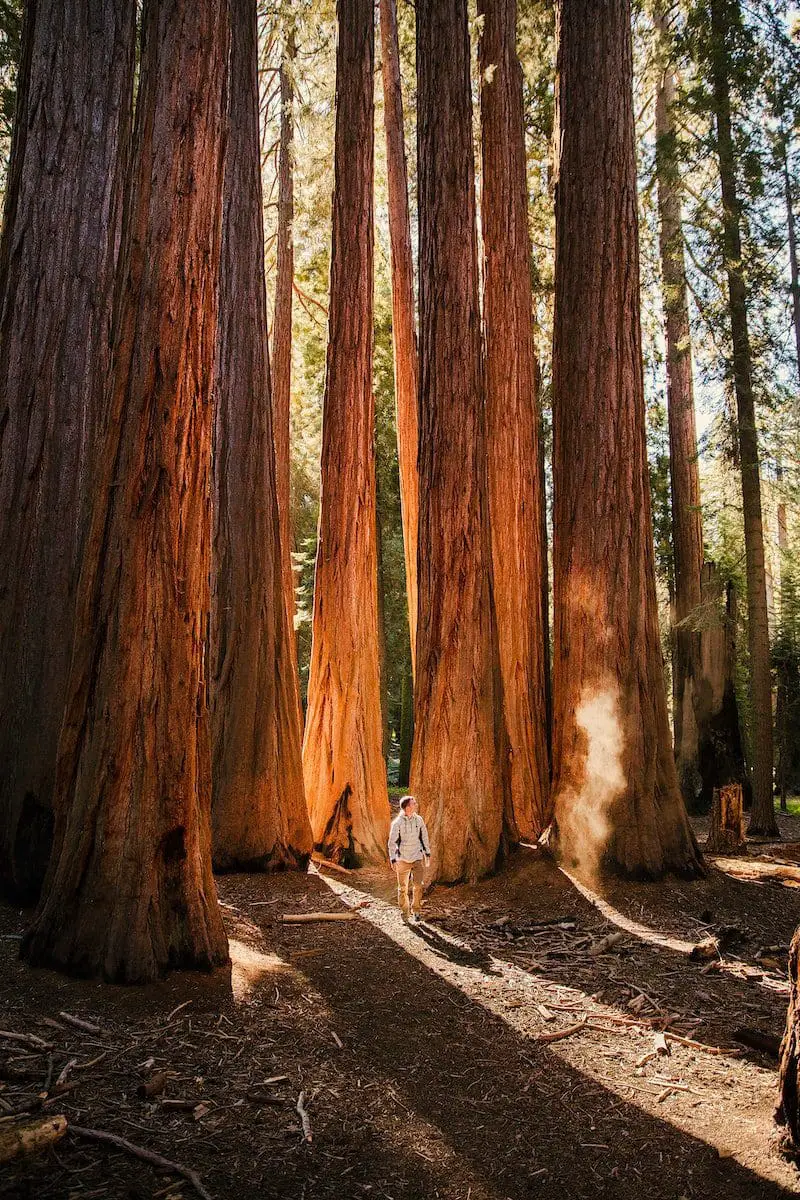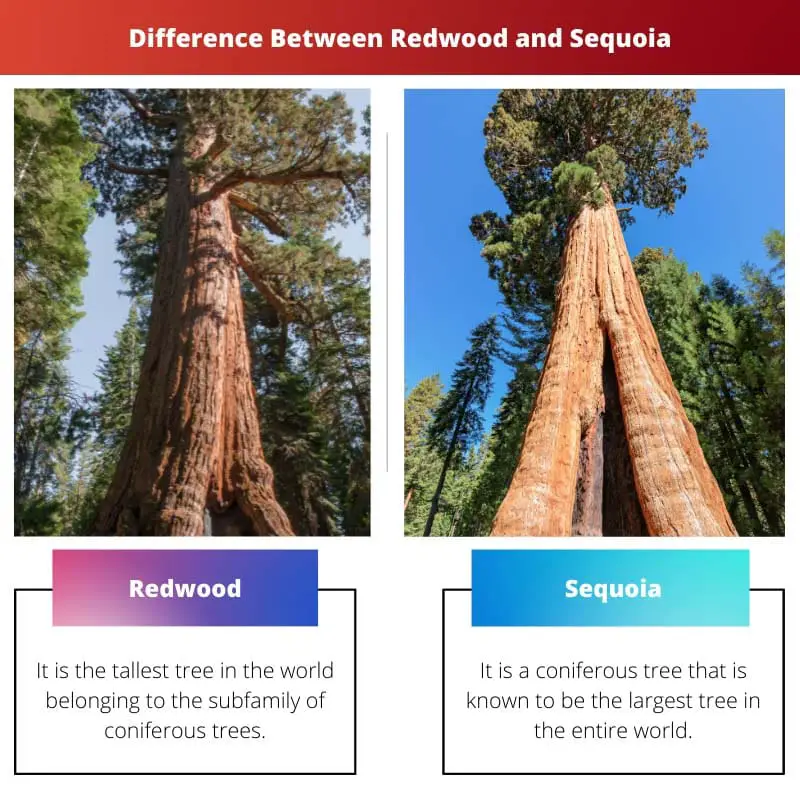Trees are the essence of our life. They sustain us and the rest of the living organisms. Just like there is diversity in humans, there is diversity in the world of trees as well.
Key Takeaways
- Redwood trees are taller and narrower than Sequoia trees.
- Redwood trees have a darker, more fibrous bark, while Sequoia trees have a reddish-brown, deeply furrowed bark.
- Redwood trees are found in coastal regions of California, while Sequoia trees are found in the Sierra Nevada mountain range.
Redwood vs Sequoia
The difference between Redwood and Sequoia is that the former is known to be the tallest tree of all, whereas the latter has the reputation of being the largest or widest tree in the world. The two different kinds of trees also vary in their place of availability, trunk size, structure, etc.

The redwoods are a part of the coniferous trees. These are found in areas that are near the coast, more specifically in the coastal areas of the USA.
Sequoia, or the giant sequoia, have earned the tag of being the largest tree in the world. They are known to have the widest trunk.
Comparison Table
| Parameters of Comparison | Redwood | Sequoia |
|---|---|---|
| Definition | It is the tallest tree in the world belonging to the subfamily of coniferous trees. | It is a coniferous tree that is known to be the largest tree in the entire world. |
| Habitat | Their natural habitat is in coastal areas, specifically along the Pacific in California, USA. | These are a variety of inland trees, found specifically in the western slopes of Sierra Nevada, USA. |
| Trunk shape | Owing to its splendid length, it has a trunk that is thin and slender. | Since it is the largest tree in the world, it has a mammoth-sized trunk. |
| Wood texture | The texture of its wood is finer and comparatively softer. | The texture of sequoia wood is a little rough and coarse. |
| Usage | It is known to have very valuable timber, which is used in lumbering industries. | Since they are not good for construction purposes, they serve well in horticulture and tourism arenas. |
What is Redwood?
Belonging to the family of Cupressaceae, the Redwood trees fall into the category of coniferous trees. These trees are variously known as coastal redwoods or Californian redwoods.
Redwood trees are also known for the longevity of their lives. The average life of these trees is approximately 2000 years, and their average height is said to be around 115 meters.
More specifically, they are found along the coast of the Pacific Ocean in California, USA. The color of the bark of redwood trees is faint chocolate brown.
It is deemed as one of the best species for timber and is highly valuable in lumbering industries. In earlier days, it was also used for the construction of railway tracks and lines.

What is Sequoia?
The Sequoia tree has its roots in the family of coniferous trees. Specifically called the giant sequoia, it falls under the broad category of redwoods.
These are also said to be one of the longest-living trees on the planet. Just like the coastal redwoods, they, too, are evergreen trees, but they differ from them in height and width.
They are naturally found in inland areas. The groves in the western slope of Sierra Nevada, USA, are abundant with Sequoia trees.
These trees are conferred with properties that make them fire resistant and, at the same time, do not allow their wood to decay easily.

Main Differences Between Redwood and Sequoia
- The redwood trees have a thin and slender trunk, whereas the sequoias have a massive and large trunk.
- The leaves of Sequoia trees have scales that make them easily distinguishable from the Redwoods.

- https://link.springer.com/article/10.1007/s11104-012-1286-4
- https://digitalcommons.calpoly.edu/nrm_fac/69/

I appreciate the comprehensive explanation of the main differences between Redwood and Sequoia, it really sheds light on the specifics of each tree.
Agreed, the clear comparison makes it easier to discern the unique attributes of these two distinct species of trees.
The detailed explanation of the characteristics of Redwood and Sequoia trees is quite enlightening and enriches our knowledge about these majestic trees.
I couldn’t agree more, the nuanced description is immensely valuable in comprehending the distinctions between these two types of trees.
Indeed, the depth of information provided here truly enhances our understanding of Redwood and Sequoia trees.
The article presents a well-structured and informative comparison between Redwood and Sequoia, making it an enriching read for anyone interested in trees and botany.
Indeed, the article is well-organized and elucidates the unique features of these trees in a compelling manner.
The insightful information about the longevity and uses of Redwood and Sequoia trees provides a holistic view of their significance in different industries and environments.
Absolutely, understanding the wide-ranging impact of these trees offers a deeper appreciation for their ecological importance and commercial value.
The difference between Redwood and Sequoia is quite significant and it’s quite interesting to know about their unique characteristics and how they differ even when they’re so related.
Yes, that is quite fascinating to learn about, their distinct properties make them stand apart from one another.
The detailed description of the habitat, trunk shape, wood texture, and other essential elements in the comparison is quite informative and adds depth to our understanding of these trees.
Indeed, by delving into these specific aspects, one can truly appreciate the intricacies of the differences between Redwood and Sequoia.
The article’s meticulous comparison of Redwood and Sequoia provides a comprehensive understanding of the unique properties and characteristics of these impressive trees.
Completely true, the article’s detailed comparison is highly enlightening and offers a thorough insight into Redwood and Sequoia trees.
The detailed explanations about the habitat, trunk size, and other characteristics of Redwood and Sequoia trees effectively highlight the diversity and significance of these trees.
I couldn’t agree more, the comprehensive descriptions add significant value to our understanding of Redwood and Sequoia.
Absolutely, the depth of information truly emphasizes the distinct attributes of these remarkable trees.
The references listed at the end of the article are a great addition as they offer a pathway for further exploration of these fascinating trees through academic sources and scholarly articles.
Absolutely, the inclusion of references enhances the credibility and depth of the information provided in the article.
I completely agree, the references allow readers to delve deeper into the subject matter and gain additional insights.
The comparison table presented here provides a clear and concise understanding of the differentiation between Redwood and Sequoia trees, making it easily comprehensible for readers.
Absolutely, the succinct comparison table is an excellent way to grasp the unique features of each of these remarkable trees.